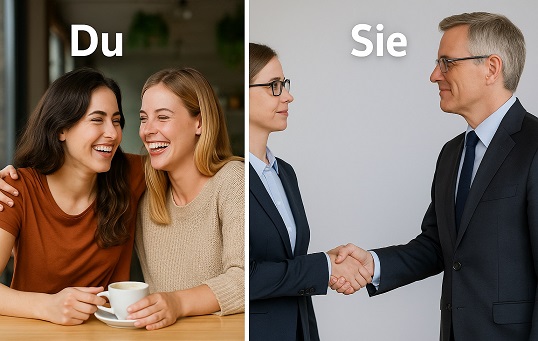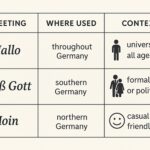
In English, saying “you” is simple. Whether you’re talking to a child, a teacher, a stranger, or your best friend, the pronoun stays the same. But in German, you face an immediate social decision: Do you use “du” or “Sie”? This single linguistic fork in the road carries weight. It reveals your age, your social role, your level of familiarity – and it can open doors or shut them quickly.
This article is your cultural guide to understanding how and when to use “du” or “Sie” in Germany. You’ll learn about regional habits, generational shifts, the delicate “Duz-Angebot,” and how to avoid embarrassment in schools, businesses, or on the street. Plus, we’ll explore why this formality isn’t just about language – it’s about values.
What’s the Difference Between “Du” and “Sie”?
Let’s start with basics:
- Du is informal. It’s used with friends, close colleagues, children, pets, and often among younger people.
- Sie is formal. It’s used for strangers, in professional settings, with older people, and in customer service interactions.
They both mean “you,” but:
- “Du” signals familiarity, closeness, or social equality.
- “Sie” signals distance, respect, or hierarchy.
Why Pronoun Choice Matters in Germany
To outsiders, this might seem like a mere linguistic quirk. But to Germans, it’s deeply cultural. It encodes assumptions about:
- Power dynamics
- Social distance
- Professionalism
- Mutual respect
Using the wrong pronoun can:
- Create awkwardness
- Offend someone
- Seem presumptuous or overly distant
Germans are highly attuned to social norms – and pronoun choice is one of the first cues in any conversation.
➡️ Related reading: The Art of German Small Talk (And Why It’s Not So Small)
Who Uses “Sie”? The Safe Default
In any of these situations, “Sie” is expected:
- When speaking to someone older than you (especially if you don’t know them well)
- In professional settings (bosses, coworkers you don’t know well)
- In shops, restaurants, or customer service
- On public transport, with strangers
- At official events, government offices, schools
It’s always safer to start with “Sie” and wait for an invitation to switch to “du.” Think of it as wearing a tie to a first meeting – formal by default.
When Can You Use “Du”?
Informal “du” is commonly used:
- Among friends, classmates, and family
- In most youth or student circles
- Within close-knit clubs or sports teams
- With children (always “du”)
- With dogs (yes, pets always get “du”)
It’s increasingly common in startups, tech companies, and creative industries, where informality is part of the work culture. But even then, the “du” is often preceded by an informal agreement.
The “Duz-Angebot”: Offering the Du
This is one of the most important and uniquely German etiquette rules. Switching from “Sie” to “du” requires an explicit offer – the “Duz-Angebot.”
Here’s how it works:
- The person in the higher social position or older age offers the “du.”
- The phrase might be: “Wollen wir uns duzen?” (Shall we say ‘du’?)
- If accepted, you shake hands and usually say your first name: “Ich bin Sabine.”
Once this is done, both parties use “du” from then on.
➡️ Want to avoid cultural blunders? Read: Invited to a German Home? What to Bring and How to Behave
What Happens If You Get It Wrong?
Most Germans are surprisingly forgiving toward foreigners who make mistakes – especially if it’s clear you’re still learning. But still:
- Using “du” too soon can feel disrespectful.
- Using “Sie” when “du” has already been offered can feel stiff or cold.
Tip: When in doubt, default to “Sie.” Germans respect formality more than they expect casual charm.
Generational and Regional Shifts
Formality in German is changing. Consider these trends:
- Younger generations are more relaxed and use “du” earlier.
- In East Germany, “du” was historically more common (especially under socialism).
- Urban areas (e.g., Berlin, Hamburg) lean toward informality.
- Southern Germany (e.g., Bavaria, Baden-Württemberg) still values “Sie” in many contexts.
This means you’ll need to read the room. A student party in Berlin? Use “du.” A bakery in Munich? Stick with “Sie.”
Siezen in the Workplace: Still the Norm?
In traditional sectors – law, academia, government – “Sie” remains the norm. Some firms even have official internal rules about pronoun use. But change is happening:
- Many startups begin on “du” terms.
- In multinational teams, English often replaces the problem.
- Hybrid models exist – for instance, using “du” in speech but writing emails formally.
HR departments sometimes host sessions about switching to a “Du-Kultur.” But this can backfire if not handled delicately.
When Germans Switch Back to “Sie”
Interestingly, it’s not unheard of for Germans to return to “Sie” after a failed friendship or breakup. While rare, this linguistic reset shows how powerful pronoun use is.
You might hear someone say: “Wir siezen uns wieder.” (Let’s go back to using ‘Sie.’) It signals emotional distancing and restored formality.
How to Ask Politely
If you’re unsure whether to use “du” or “Sie,” you can ask politely:
- “Darf ich du sagen?” – May I say ‘du’?
- “Möchten Sie beim Sie bleiben?” – Would you prefer to stay with ‘Sie’?
- “Wollen wir uns duzen?” – Shall we switch to ‘du’?
Don’t be shy about asking. Germans admire social awareness and clear communication.
Foreigners and the Double Standard
It’s worth noting that Germans often cut non-native speakers some slack. You may be “geduzt” (spoken to with “du”) even in formal settings, simply because you’re foreign.
Some foreigners find this charming. Others find it mildly condescending. Either way, it’s not meant to offend – just to simplify.
Written German: Sie Is Still King
In writing – especially emails, business letters, or signs – “Sie” is still overwhelmingly dominant. Unless you’re in a known “du” context, use formal forms:
- “Sehr geehrte Frau Schneider,” not “Hallo Sabine.”
- “Mit freundlichen Grüßen,” not “Liebe Grüße.”
Spelling note: “Sie” is capitalized when formal. “sie” (lowercase) means “she” or “they.”
Cultural Comparisons: How Other Languages Handle It
German isn’t alone in managing social formality with pronouns. For example:
- French: tu vs. vous
- Spanish: tú vs. usted
- Russian: ty vs. vy
- Korean: has whole levels of speech honorifics
But Germany’s “du/Sie” dynamic is especially noticeable because of how central formality is to its cultural DNA.
➡️ Explore more linguistic nuance: The Evolution of the German Language: A Cultural History
Pronouns as a Mirror of Values
Why does all this matter so much? Because language reflects social values. In Germany:
- Respect is shown through distance
- Familiarity is something earned
- Equality is important, but not automatic
The “du/Sie” distinction embodies these values. Mastering it signals cultural fluency as much as linguistic skill.
When in Doubt, Stay Polite
If you take only one rule away from this guide, it should be this: Start formal, switch when invited.
Navigating “du” and “Sie” is more than grammar – it’s social intelligence. Getting it right will make your interactions smoother, your conversations more confident, and your presence in Germany far more comfortable.
And if all else fails? Smile, listen, and let your German host lead the way.
More German Language and Culture Guides:
➡️ The Art of German Small Talk (And Why It’s Not So Small)
➡️ German Greetings by Region: Grüß Gott, Moin, and Hallo
➡️ From Kaffee to Kompliment: Dining Invitations and How to Respond in Germany
➡️ The Evolution of the German Language: A Cultural History
➡️ Invited to a German Home? What to Bring and How to Behave







